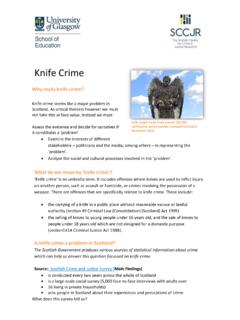Transcription of Impact of punishment: families of people in prison - SCCJR
1 1 Impact of punishment : families of people in prison Background The primary purpose of a prison sentence (or any form of disposal) is to punish the offender. However, given practical, financial, social and emotional effects of imprisonment, a prison sentence can also have punitive consequences for families outside prison . Prisoners families , particularly their children , are often termed the innocent victims of crime (and punishment ). For a long time, prisoners families were also referred to as the hidden or invisible victims of punishment or crime, since the hardships they experienced were not immediately obvious.
2 Now, in scotland and elsewhere, the experiences of prisoners families are receiving greater attention from policy, practice, academia and the media. The effects of imprisonment on families are often called the collateral or ripple effects of imprisonment. What is the Impact of imprisonment on prisoners families ? Since every family is different (including who is considered to be part of a family ), the Impact of imprisonment is different for every family. Yet, research in scotland and across the world suggests that there are some fairly common experiences.
3 2 What does the research say? families experience emotional distress even with the temporary loss of a loved one from the family home and/or family life: for example, families miss out on sharing family events such as birthdays and Christmas, or even simple family activities such as meals, with the imprisoned family member. Offenders are stigmatised for their offence, and their families often are too. families are seen as guilty by association even though they are legally innocent and generally have had no involvement in the offence.
4 This stigma is sometimes referred to as courtesy stigma or stigma by association. This stigma makes the imprisonment even more difficult for family members, and it can also mean that families are treated negatively by other members of their community, or face negative treatment from colleagues, peers, the media and even friends and family. Following the imprisonment of a person, partners of prisoners are often forced to take on multiple roles and responsibilities, particularly where the incarcerated family member has previously had an active role in the household.
5 Imprisonment tends to impose financial strain on the families of the prisoners in two ways: by decreasing the family income and by increasing family expenditure, due to costly visits and phone calls, and handing in money for their loved ones in prison . prison thus can exacerbate existing socio-economic disadvantage (Houchin, 2005). For more information about the financial Impact on families , see this research report from families Outside. The Joseph Rowntree Foundation also conducted a study exploring the financial disadvantage experienced by prisoners families .
6 There are often particular difficulties associated with prison visiting. Visiting often involves great deal of time, effort (both physical and emotional) and expense. Visiting can be quite an emotional experience, with both positive and negative feelings in the mix: for example, families usually enjoy seeing their imprisoned loved one, but due to the brevity of the visit saying goodbye comes quickly, which can be distressing. 3 As this overview shows, for most families the imprisonment of a family member has negative effects.
7 However, in some cases imprisonment might be a positive experience for the family unit: this tends to be in cases where abuse or violence has been present in the home, and imprisonment offers relief from this (See SCCJR Violence against women and girls for more information on domestic abuse). This article by Jessica Breen offers an overview into the effects of imprisonment on families in general, and offers insights into the situation of prisoners families in Ireland specifically. Focus: the children of prisoners What are the effects?
8 Babies As a recent NSPCC report points out, pregnancy and early years are important for giving in which babies a healthy and safe start. Mothers need support during this time, especially during pregnancy. Babies need a stimulating environment and a positive mother-baby relationship. However, a mother s involvement in the criminal justice system, especially prison , makes this much more difficult. Those involved in the criminal justice system, especially women, often have poorer rates of health, particularly mental health, than the general population (See SCCJR Who s in prison ?)
9 A snapshot of scotland s prison population and SSCJR Women in prison ). The criminal justice system, especially custody, disrupts these important relationships. Some babies are born or looked after in prison in dedicated Mother and Baby Units. While these units minimise the trauma of separation, these are far from ideal environments for babies development. *All information from the NSPCC report (in collaboration with Barnardo s) (2014) An Unfair Sentence, All Babies Count: A Spotlight on the Criminal Justice System. children In addition to the general Impact of imprisonment on family life, children often experience specific effects: 4 Stigma for children can be manifested in being bullied by classmates in school.
10 Since the non-incarcerated parent wants to protect their child, it is not uncommon for children not to be told the truth, or full truth, about the imprisonment. children might be told that dad is working away . This can lead to confusion and upset, particularly where children visit the family member in an unfamiliar and daunting and in this case unknown environment of the prison . Prisoners children are at higher risk of developing mental health problems than children without imprisoned parents. Visiting can be difficult for children , with poor facilities that are not child friendly and confusing rules restricting how they can interact with their imprisoned family member; families often have to travel long distances to a prison , and are often reliant on public transport; visiting times may not be compatible with tea time and bed time routines, leaving children irritable or tired, which then may Impact on school performance the following day.


